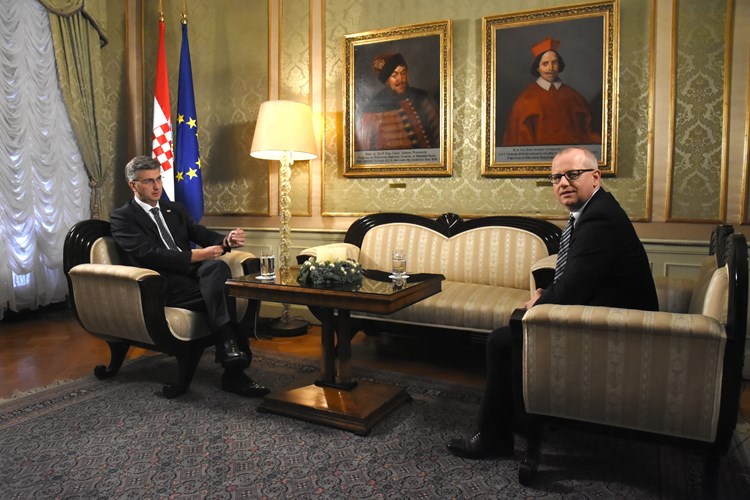- Published: 05.12.2018.
Plenković: Until reaching agreement we want INA to work well and share shareholders more with confidence
The Central European Initiative (CEI) has been revitalised, Prime Minister Andrej Plenkovic said in an interview with Croatian public television HRT on Tuesday evening after a summit in Zagreb at which 18 countries of Central and Eastern Europe strongly supported Ukraine whose territorial integrity had been violated by Russia.
Noting that in the last two years there had been no interest in the CEI, Plenkovic said that the active Croatian presidency this year and the two-day summit was an opportunity to consider all current developments faced by the CEI members, including economic issues, security, migration and energy.
"This summit was the crown of our presidency. Several prime ministers attended, which essentially marked the revitalisation of the Central European Initiative, which didn't attract much interest in recent years," the Croatian premier said.
A business forum was held as part of the summit, and Plenkovic said that the overall impression was good for Croatia because "these 18 countries that were represented in Zagreb yesterday and today account for 55 percent of our trade." All key Croatian trading partners, except Germany, were in Zagreb and this forum "is very useful for strengthening economic relations," he added.
The CEI was established in Budapest in 1989 with a view to assisting countries in the region in joining the European Union. Of the 18 CEI member states, 10 have joined the EU, five are on track to becoming members of the bloc, while three are members of the Eastern Partnership. The CEI members are: Albania, Austria, Belarus, Bosnia and Herzegovina, Bulgaria, Croatia, Czech Republic, Hungary, Italy, Macedonia, Moldova, Montenegro, Poland, Romania, Serbia, Slovakia, Slovenia, and Ukraine.
All summit participants expressed their strong support for Ukraine over the crisis in the Sea of Azov.
Plenkovic said that three messages were issued from the summit in this regard. "Russia violated international law by blocking the passage of Ukrainian vessels in the Kerch Strait, it was called upon to release the arrested Ukrainian sailors, and the third message concerns Ukraine's sovereignty."
"All CEI countries respect the territorial integrity of Ukraine, which is a member of this organisation, and these messages make sense and are logical," he added.
Croatian-Hungarian relations
The summit brought together five prime ministers and the focus was on Hungarian Prime Minister Viktor Orban.
Croatia has excellent relations with Hungary, their trade exceeds $2 billion, many Hungarian tourists visit Croatia, and the level of protection of the Hungarian minority in Croatia and the Croatian minority in Hungary is high, Plenkovic said.
There are also several outstanding issues, which Orban described as "a thorn under the nail". Plenkovic said these issues solely concerned the relationship between the Croatian oil company INA and Hungary's MOL, notably management rights, finance, and the judiciary.
Hungary is refusing to extradite MOL CEO Zsolt Hernadi to face charges before a Croatian court that he had bribed former Croatian prime minister Ivo Sanader to cede management rights over INA to the Hungarian company. Plenkovic announced two years ago that INA wanted to buy back MOL's stake.
MOL holds a 49 percent stake in INA and the Croatian government owns 44.84%.
"At this point we are pretty far from an agreement on how much this could cost, and when we come closer in our views, this topic will be brought up again," the Croatian prime minister said. Until then, INA should ensure that relations between the shareholders are as good as possible, promoting trust and improving business performance, he added.
Speaking of the construction of a floating LNG terminal on the northern Adriatic island of Krk, Plenkovic said that in order for this EUR 230 million project to be profitable, it was necessary for other countries to participate and to agree a lease.
The amount of 2.6 billion cubic metres is too much for Croatia for the terminal to be cost effective, and "we are discussing this with Hungary and other countries," Plenkovic said, adding that Hungary's interest in gas from the Krk terminal would depend on its price. He believes that these talks will be productive and "will put Croatia on a quite different energy map of Europe."
Migration
Among the topics discussed at the summit was migration. Plenkovic said that the CEI countries wanted to regulate legal migration and work together on preventing illegal migration. "With the support of the European Union, solutions should be sought at the source of the problem," in unstable countries hit by war and poverty, he said and concluded: "A common foreign and security policy can contain this crisis."
Text: Hina
